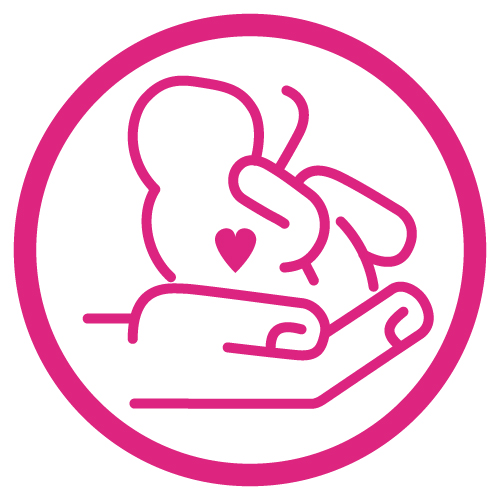
Advancements in Neonatal Pharmacology Lecture Pack
Having a strong understanding of pharmacokinetics and how they are impacted by the development of the neonate is a crucial part of providing safe and effective care in the NICU. Particularly for preterm infants, medication use in the NICU is impacted by physiological immaturity and doses must constantly be adjusted to account for increases in weight and maturation of elimination pathways. This package focuses on providing current and evidence based information about pharmacology in the NICU, including a look at new and upcoming therapies. Join us to learn more about medication and breastmilk, advances in enteral nutrition, pharmacotherapy for hemodynamic instability, classic versus new and upcoming therapies for neonatal seizures, toxicities of common NICU medications and advanced post-operative pain management strategies.


In her employed life Wendy was a community pharmacist and also worked in doctor surgeries supporting cost effective, evidence-based prescribing.
Wendy left paid work to concentrate on writing Breastfeeding and Medication (Routledge 2nd edition 2018), developing information and training material on drugs in breastmilk as well as setting up her own website www.breastfeeding-and-medication. She has also published Breastfeeding for Dads and Grandmas (Praeclarus Press) and Why Mothers Medication Matters (Pinter and Martin). She is also co editor of a book to be published January 2020 called A guide to breastfeeding for medical professionals (Routledge).
Wendy is known for her work on providing a service on the compatibility of drugs in breastmilk and has been a breastfeeding peer supporter for 30 years. She is passionate that breastfeeding should be valued by all and that medication should not be a barrier. She has 3 daughters and 5 grandchildren. All her family seem as passionate about breastfeeding as she is and currently all 3 of her daughters are breastfeeding.
She was awarded a Points of Light award by the Prime Minister in 2018 and nominated for an MBE in the New Year's Honours List 2018 for services to mothers and babies. She received her award at Windsor Castle in May 2019 from Her Majesty the Queen.
Topic: Medication and Breastmilk in the NICU - [View Abstract]
Topic: Pharmacokinetics and Clinical Implications of Drugs in Human Milk: The Substance-Exposed Infant - [View Abstract]
1. Describe the skills needed to support a mother to express her breastmilk and transition to breastfeeding directly and how these may be seen as less important than providing other milk to the baby
2. Explain the pharmacokinetic barriers for a baby born pre-term or otherwise vulnerable, needing medication
3. Describe the transfer of drugs into breastmilk for a birth mother or a donating mother providing breastmilk for babies in NICU
For optimal health, a baby born pre-term should be enabled to breastfeed as soon as possible or to receive expressed breastmilk from their birth mother. Where this isn't an option, donor breastmilk can be used. Breastfeeding a pre term or otherwise vulnerable baby in NICU is challenging, and where medications are involved there may be additional barriers. The baby may need medication to treat its own medical needs, the birth mother may also need medication and it is important to consider the risks of these passing through breastmilk. If the baby is to receive donor breastmilk then it is essential that the donor is not taking anything that might impact on the health of the recipient baby. In this presentation some of the barriers will be discussed along with discussion on how these may be overcome using the limited evidence base available.


M. Petrea Cober, PharmD, BCNSP, BCPPS, FASPEN, attended the University of Tennessee, College of Pharmacy in Memphis, Tennessee. She completed her PGY1 Pharmacy Residency at Penn State Milton S. Hershey Medical Center in Hershey, Pennsylvania, and her PGY2 Pharmacy Residency in Pediatrics at the University of Michigan Hospitals and Health System in Ann Arbor, Michigan. She is currently the Clinical Pharmacy Specialist - Neonatal Intensive Care Unit and PGY1 Residency Program Director at Akron Children's Hospital where she provides clinical services and precepts pharmacy students and PGY1 pharmacy residents. She is also a Professor in the Department of Pharmacy Practice at Northeast Ohio Medical University (NEOMED). Her didactic teaching is in the areas of pediatrics, women’s health, and nutrition. She was awarded the 2021 Stanley Serlick Award from the American Society for Parenteral and Enteral Nutrition (ASPEN) recognizing her contributions to parenteral nutrition safety and serves as the current Chair-elect of the ASPEN Parenteral Nutrition Safety Committee.
1. Describe the etiology of neonatal seizures and the need for therapeutic management.
2. Compare and contrast various anti-epileptic therapies in the management of neonatal seizures.
3. Formulate a course of therapy for a patient experiencing neonatal seizures.
The lifetime risk of seizures is highest in the neonatal period. While the etiology of neonatal seizures is commonly the result of acute brain injury, other possibilities exist. Unfortunately, the need to treat neonatal seizures with anti-epileptic therapies or the timing and duration of therapeutic management is still vastly unknown. While phenobarbital has long been considered the mainstay of first-line medical therapy for neonatal seizures, newer agents are increasing in their popularity due to fewer side effects and concerns regarding potential neuronal apoptosis with phenobarbital. This presentation will discuss the etiology, need and timing for therapeutic management, compare and contrast various anti-epileptic therapies, and first-line, second-line, and therapies following initial failure for neonatal seizures.


Pavel graduated from Purdue University with a BS in Medicinal Chemistry and Molecular Pharmacology and Doctor of Pharmacy. He completed his general residency at Parkview Medical Center and Pediatric Residency at University of Chicago. He is a neonatal ICU (NICU) and antimicrobial stewardship program clinical pharmacist at Nationwide Children's Hospital (NCH) in Columbus, OH. Pavel precepts pharmacy residents and students from several colleges of pharmacy while also serving as a preceptor to international pharmacy scholars from Europe, Africa, and Middle East. He is currently involved in a multicenter study to investigate barriers, enablers and opportunities for implementing neonatal antibiotic stewardship in public and private hospitals in South Africa. He is also involved in implementation of neonatal antimicrobial stewardship programs in several hospitals in Lebanon. Pavel is the principal investigator on the study evaluating interventions to reduce antibiotic use among surgical patients in the NICU: The NO-More-AntibioticS and Resistance in Surgery (NO-MAS-R-S) Study.
1. List common medications associated with adverse drug effects in the neonatal intensive care unit (NICU)
2. Describe common clinical signs and biochemical abnormalities associated with ADEs
3. Explain clinical scenarios when holding or considering dose adjustment of medications would be in patients' best interest


Teresa Puthoff, BS Pharm, PharmD, BCNSP received her professional degrees from the University of Cincinnati and The Ohio State University. She has over 30 years experience working in high risk delivery and referral centers. She currently works as an Advanced Practice Pharmacist in the NICU at Nationwide Children’s Hospital in Columbus Ohio. Her current professional passions are neonatal nutrition, developmental pharmacology, BPD, and analgesia and sedation management. She teaches PGY-1 and PGY-2 pharmacy residents as well as Neonatal Fellows in medicine, physical therapy and respiratory therapy. She has published on the use of regional analgesia in the NICU and is currently implementing the use of NCA and wound catheters for post op pain management as a part of ongoing efforts to reduce opioid and benzodiazepine use in the NICU.
1. List 2 reasons why opioid reduction is important for the neonatal patient population
2. Describe effective pain management of patients receiving regional analgesia and/or nurse-controlled analgesia
3. Explain monitoring parameters for adjunctive therapy
There has been an evolution in knowledge regarding the consequences of untreated pain in the infant as well as the unintended long-term effects of providing systemic analgesics. Infants were often subjected to surgical procedures without analgesia until the landmark paper by Anand and Hickey demonstrated improved morbidity and mortality when proper anesthesia and analgesia were provided to infants undergoing surgical procedures. Early life stress and chronic pain has shown evidence of long-term adverse neurodevelopmental effects upto adulthood. An FDA Drug Safety Communication Alert advised practitioners that repeated or lengthy exposures to anesthetics and sedatives have the potential to have adverse effects on neurodevelopmental outcomes. Many anesthetics, benzodiazepines, and opiates act via NMDA (N-methyl-D-aspartate) receptor agonism, GABA (gamma amino butyric acid) agonism or both. Animal model studies have demonstrated neuro-apoptosis and subsequent cognitive impairments due to these drug-receptor interactions. Cumulative opioid exposure has been associated with adverse cognitive outcomes in former extremely low birth weight infants (ELBW). These concerns prompted many to pursue other pharmacologic modalities and surgical techniques to minimize the use of postoperative opioids. This lecture will discuss the use of Regional analgesia (RA) and Nurse Controlled Analgesia (NCA) in post operative infants in the NICU.


Consultant neonatal pediatrician with special interest in neonatal nutrition, probiotics, gut-brain-microbiota axis and long-term neurodevelopment. Dr Jape leads the high-risk neonatal follow-up program for her tertiary referral institute. Currently the chair for the Perinatal Society of Australia and New Zealand long-term outcomes sub-committee. Dr Jape is reviewer for national and international medical journals.
Topic: Gut-Microbiota-Brain Axis in Neonates and Infants - [View Abstract]
1. Describe causes of suboptimal nutrition in preterm infants
2. Explain how recent advances in enteral nutrition strategies are changing the approach to nutrition in the NICU
3. Describe recent advances in nutrition for term babies in the NICU with surgical gut conditions and congenital heart disease
Infants admitted to neonatal intensive care units (very preterm and extremely preterm, term infants with HIE, term infants with surgical gut conditions) are at high-risk of suboptimal nutrition. They are at increased risk of poor growth and neurodevelopment in subsequent life. Improved enteral nutrition has been associated with better weight gain and improved neurocognitive outcomes in infancy , childhood and adolescence. This presentation aims to assess advances in enteral nutrition strategies across the different high-risk infant groups to highlight new research and optimize clinical care.


Jim Thigpen has been a pediatric clinical pharmacist for 30 years and is currently an associate professor of pharmacy at East Tennessee State University Bill Gatton College of Pharmacy. When he began his training at MUSC in Charleston, SC, they were investigating Survanta and he has been witness to and a participant in the evolving world of neonatology since. He has spoken at several neonatal nursing conferences over the years and enjoys helping other practitioners learn about and apply pharmacotherapy in this special population.
Topic: Clinical Pain Management in the Neonate - [View Abstract]
Topic: Pharmacotherapy for Hemodynamic Instability in Neonates - [View Abstract]
1. Describe how medications used to treat hypotension are thought to work in the neonate.
2. List the common side effects of the discussed medications when used in the neonate.
3. List the usual indications for the use of epinephrine, dopamine, dobutamine, hydrocortisone, milrinone, norepinephrine, vasopressin in the neonatal patient.
4. Describe the usual ways to treat catecholamine extravasation.
There are many causes of hemodynamic instability in the neonate, with up to half of very low birth weight (VLBW) infants exhibiting evidence of low cardiac output and poor myocardial contractility within the first 12 hours of life. Failure to appropriately identify and address the causes of hypotension can lead to dramatic consequences in this vulnerable population. Pharmacotherapy is employed to provide action at specific receptors that result in improved cardiac output, relaxation and vasodilation of smooth muscle, as well as specific effects on the kidneys. Although the common agents have been used for decades, there are new developments in therapy. Refinements on patient selection, managing expected side effects, and effective dosing and have continued to evolve.
Accreditation
CERPs - Continuing Education Recognition Points
Applicable to IBCLC Lactation Consultants, Certified Lactation Consultants (CLCs), CBEs, CLE, Doulas & Birth Educators. GOLD Conferences has been designated as a Long Term Provider of CERPs by IBLCE--Approval #CLT114-07. This program is approved for 6 CERPs (5 R-CERPs and 1 L-CERP).
CMEs - Continuing Medical Education Credits for Physicians & Nurses
The AAFP has reviewed the activity and deemed it acceptable for AAFP credit. Term of approval is from 05/30/2023 to 05/30/2024. Physicians should claim only the credit commensurate with the extent of their participation in the activity. This activity is approved for 6 AAFP Prescribed CME credits.
Nursing CEUs - Nursing Contact Hours
This nursing continuing professional development activity was approved by the American Nurses Association Massachusetts, an accredited approver by the American Nurses Credentialing Center’s Commission on Accreditation for 6 Nursing Contact Hours.
- View this presentation in its entirety, under your individual GOLD login info
- Successfully complete a post-test (3 out of 3 questions correctly answered)
- Fill out the Evaluation Survey
If you have already participated in this program, you are not eligible to receive additional credits for viewing it again. Please send us an email to [email protected] if you have any questions.
Additional Details
Viewing Time: 4 Weeks
Tags / Categories
(IBCLC) Clinical Skills, (IBCLC) Development and Nutrition, (IBCLC) Pathology, (IBCLC) Pharmacology and Toxicology, (IBCLC) Physiology and Endocrinology, Change & Innovation, Evidence Based Care in Nicu, NICU Nutrition & Feeding, Pain Management in the NICU, Pharmacology in the NICU
How much time do I have to view the presentations?
- The viewing time will be specified for each product. When you purchase multiple items in your cart, the viewing time becomes CUMULATIVE. Ex. Lecture 1= 2 weeks and Lecture Pack 2 = 4 Weeks, you will have a total of 6 weeks viewing time for ALL the presentations made in that purchase.
- Time for viewing the talks begins once you purchase the product. For Live Webinars & Symposiums, the viewing period begins from when the live event takes place. Presentations can be accessed 24/7 and can be viewed as many times as you like during the viewing period.
What are bundled lectures?
- Presentations may be available individually or via a bundled package. Bundled lectures are a set of lectures that have been put together based on a specific category or topic. Some lectures will be available in both individual and lecture form, whereas others will be available only via a bundled lecture pack.
Will there be Handouts?
- YES! Each lecture comes with a PDF handout provided by the Speaker.
Some lectures include a Q&A, what does that mean?
- During our online conferences, presentations that occur live are also followed by a short 15 minute Question & Answer Session. The Speaker addresses questions that were posted by Delegates during the presentation. We include the recording of these Q&A Sessions as a bonus for you.
How can I receive a Certificate?
- If this presentation offers a certificate, once you are done viewing the lecture or the lectures within a bundle, submit your attendance record in order to be able to download your certificate. You'll be able to see which credits are offered for the lecture by hovering over the "Credits Available" link within the "Speakers & Topics" tab.
Professionals that selected this package also viewed

|
|

|









